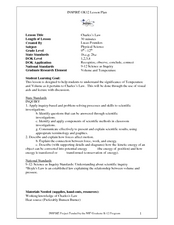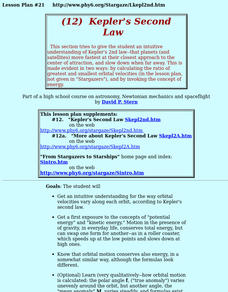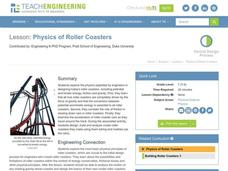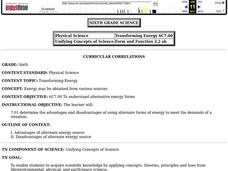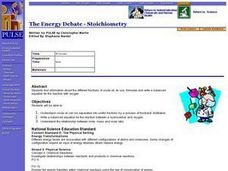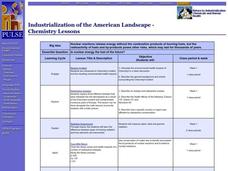Curated OER
Charles’s Law
High schoolers describe the relationship between temperature and volume. In this chemistry lesson, students perform an experiment and record their their results. They use Charles' law to explain their observations.
Curated OER
Alternative Energy
Students identify the five major alternative energy sources. In this physical science instructional activity, students assess the advantages and disadvantages for each type of energy. They complete a concept map using information they...
University of Florida
Understanding Car Crashes: It's Basic Physics!
Make an impact on young physicists with this fun collection of resources. After first watching a video and taking notes on the physics of car crashes, students go on to complete a series of activities that explore the concepts of energy,...
Curated OER
Balancing Bottles
Students explore the Law of Conservation of Matter using effervescent tablets. In this mass and energy instructional activity, students investigate how mass is conserved in the reaction of effervescent tablets and water. They will...
Curated OER
Work and Energy
Students show that energy is conserved in the laboratory. They calculate the work done by a force on an object as the product of the force and a displacement of the object from a reference point.
Curated OER
Circuit Lab
Students explore the properties of electricity. This lab shows students the need for a circuit in order to have a flow of electricity. It demonstrates Ohm's law, which relates voltage, current, and resistance.
Curated OER
A Potpourri of Thermo Questions
In this thermodynamics worksheet, learners match terms to their definitions such as enthalpy, equilibrium, bond energy, and heat capacity. This worksheet has 20 words to match.
Curated OER
No Creation-No Destruction--All in a Baggie
Students investigate the concepts of conservation of mass and simple chemical reactions. Students complete lab experiments and record all observations as well as conduct experiments on their own to determine which reactions created...
Curated OER
Heat Unit
Students define thermal equilibrium. They distinguish between internal energy and heat. Students describe how the quantity of heat that enters or leaves a substance is measured.
Curated OER
The Laws of Thermodynamics
Students investigate the concept of a thermodynamic system. The difference between a state and phase is defined as part of the experimental explanations given in writing. Students conduct experiments to demonstrate laws of science like...
Curated OER
TE Activity: The Great Divide
Students simulate the distribution of nonrenewable energy resources using cookies. They determine how the world's growing population effects the equitable distribution of these resources. They look at how engineers work to develop...
Curated OER
Renewable vs. Non-Renewable Resources
Fifth graders, after brainstorming why conservation of resources is important, distinguish between renewable and non-renewable resources. They make a list of different types of natural resources on the board and then sort them into two...
Curated OER
Kepler's Second Law
Students gain an understanding of Kepler's 2nd law--that planets (and satellites) move fastest at their closest approach to the center of attraction, and slow down when far away. They explore the concepts of "potential energy" and...
Curated OER
Kepler's Second Law
Students explore orbital velocities and how they vary along each orbit, according to Kepler's Second Law.
Curated OER
Physics of Roller Coasters
Learners study the physics used to design today's roller coasters. For this engineering lesson students complete several activities including designing their own roller coaster.
Curated OER
Version 001 – Exam 1 – David Laude (53015) 1
A 30-question multiple choice chemistry test challenges takers. Topics touched upon include thermochemistry, equilibrium, behavior of gases, and pH. Problem solving is required in order to answer most of the questions. Other questions...
Curated OER
Transforming Energy
Sixth graders study about alternate energy sources and discuss with their neighbor how alternative energy sources affect environmental conditions so that an entire species could be affected.
Edmond Public Schools
8th Grade Science Resource Book: Unit 2 - Physics
Get things moving with this extensive collection of physical science resources. Covering the fundamentals of measurement, graphing, lab safety, and experimental design as well as the specific scientific concepts of velocity,...
Texas Commission on Environmental Quality
Environmental Sciences
Whether you are teaching environmental science in junior high or studying recycling in kindergarten, there is something for all in this set of lessons designed for environmental education. The 110-page packet comes with tips for teaching...
Curated OER
Is That Natural?
Students examine how they use and waste natural resources. They participate in a class discussion about natural resources, in small groups complete a worksheet identifying ways students misuse natural resources, and create an...
Curated OER
Chemical Composition of American Coins
High schoolers investigate the chemical composition of pennies dated 1983 or later. In this chemical composition of American coins lesson plan, students scratch the surface of the penny to expose the zinc core. They put the penny in...
Curated OER
Investigation of Hooke's Law Lab
Learners determine the spring constant by conducting an investigation. In this physics lesson plan, students collect data and create a graph of force vs. displacement. They compare the results of two different methods to find spring...
Curated OER
The Energy Debate - Stoichiometry
Students determine crude oil can be separated into useful fractions by a process of fractional distillation. They write a balanced equation for the reaction between a hydrocarbon and oxygen.
Curated OER
Industrialization of the American Landscape
Students explore the Chernobyl incident and the resulting environmental health impacts. They explore three different isotopes that were released into the atmosphere. Through inquiry, students determine the difference between types of...


